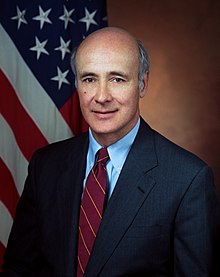Joseph Nye | |
|---|---|
 Official portrait, 1994 | |
| Assistant Secretary of Defense for International Security Affairs | |
| In office September 15, 1994 –December 16, 1995 | |
| President | Bill Clinton |
| Preceded by | Chas Freeman |
| Succeeded by | Franklin Kramer |
| Chair of the National Intelligence Council | |
| In office February 20,1993 –September 15,1994 | |
| President | Bill Clinton |
| Preceded by | Fritz Ermarth |
| Succeeded by | Christine Williams |
| Personal details | |
| Born | Joseph Samuel Nye Jr. January 19,1937 South Orange,New Jersey,U.S. |
| Education | Princeton University (BA) Exeter College,Oxford (MA) Harvard University (PhD) |
Joseph Samuel Nye Jr. (born January 19,1937) is an American political scientist. He and Robert Keohane co-founded the international relations theory of neoliberalism,which they developed in their 1977 book Power and Interdependence. Together with Keohane,he developed the concepts of asymmetrical and complex interdependence. They also explored transnational relations and world politics in an edited volume in the 1970s. More recently,he pioneered the theory of soft power. His notion of "smart power" ("the ability to combine hard and soft power into a successful strategy") became popular with the use of this phrase by members of the Clinton Administration and the Obama Administration. These theories from Nye are very commonly seen in courses across the U.S.,such as I.B. D.P. Global Politics. [1]
Contents
- Life and career
- Education
- Career
- Personal life
- Significant views
- Bibliography
- Essays and reporting
- See also
- References
- External links
Nye is the former Dean of the John F. Kennedy School of Government at Harvard University,where he currently holds the position of University Distinguished Service Professor,Emeritus. [2] In October 2014,Secretary of State John Kerry appointed Nye to the Foreign Affairs Policy Board. [3] He is also a member of the Defense Policy Board. [4] He has been a Harvard faculty member since 1964. He is a fellow of the American Academy of Arts &Sciences,a foreign fellow of the British Academy,and a member of the American Academy of Diplomacy. [5]
The 2011 Teaching,Research,and International Policy (TRIP) survey of over 1,700 international relations scholars ranked Nye as the sixth most influential scholar in the field of international relations in the past 20 years. [6] He was also ranked as one of the most influential figures in American foreign policy. In 2011, Foreign Policy magazine included him on its list of top global thinkers. [7] In September 2014, Foreign Policy reported that international relations scholars and policymakers ranked Nye as one of the field's most influential scholars. [8]